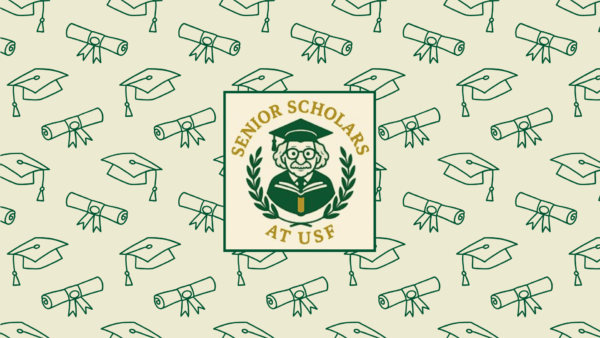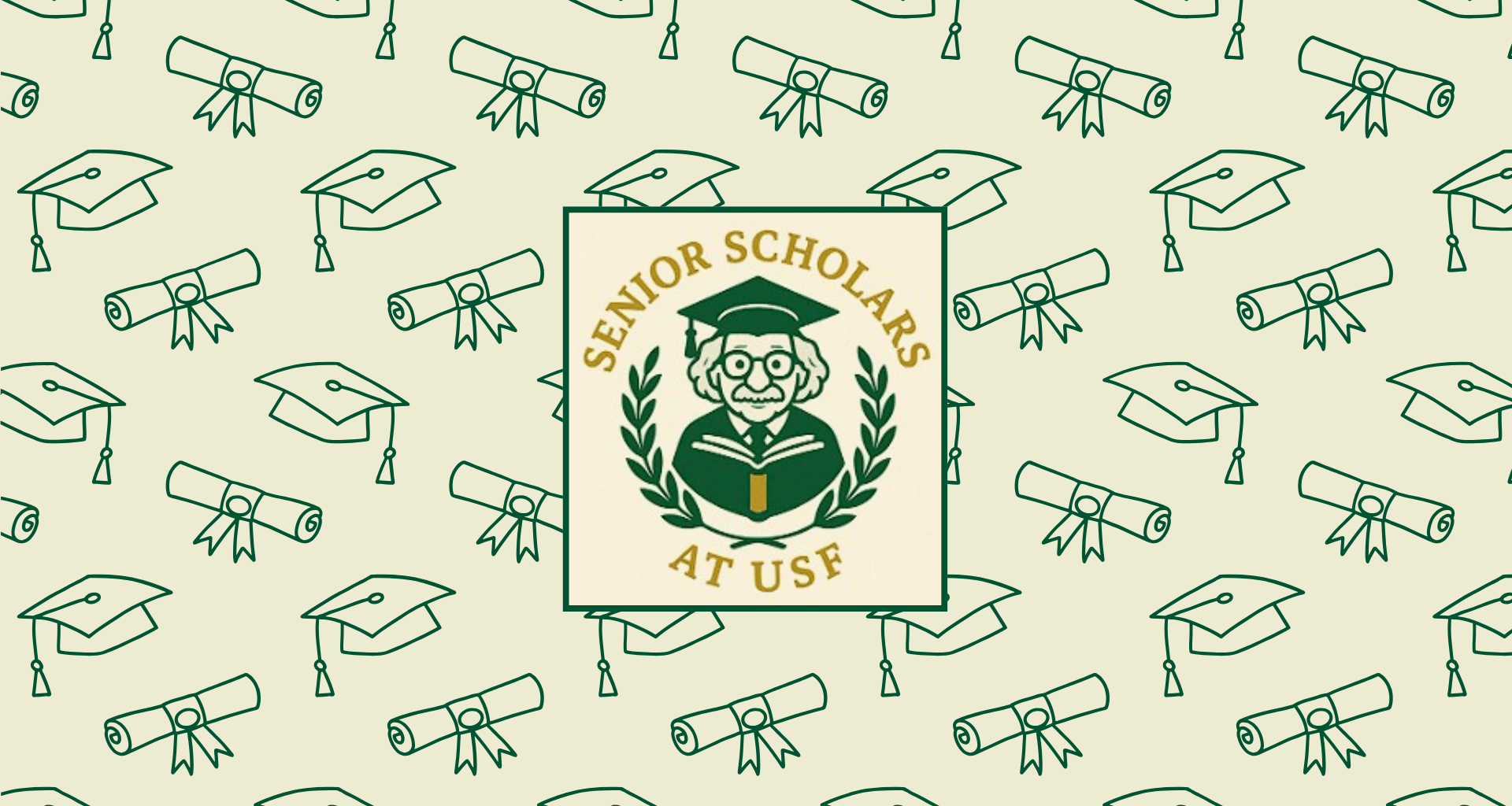 A growing social club on campus offers older adult learners a space to connect, share experiences and take part in weekly activities as part of their involvement at the university. ORACLE GRAPHIC/RACHELL ROSS
A growing social club on campus offers older adult learners a space to connect, share experiences and take part in weekly activities as part of their involvement at the university. ORACLE GRAPHIC/RACHELL ROSS
A growing group of older adults at USF is redefining what it means to be a student later in life.
Senior Scholars at USF, a club formed this fall, consists of 18 members aged 60 and up — aiming to create a supportive environment for older adults who want to remain engaged in academia.
Stanley Reynolds, 72, is the club’s president and joined USF in 2014 to take graduate-level courses in education.
Reynolds said the club provides older USF students with guidance on using campus technology and opportunities to connect with other student organizations and faculty.
He said the goal of the club is to implement “age-friendly” initiatives to include and engage older citizens in university life.
“It’s really about helping seniors navigate university life and connecting with other generations,” Reynolds said.
Reynolds said he started taking audited courses at USF after joining a project in Uganda, which sparked his interest for how education differed around the world.
“I want to make sure the things that we’re teaching them in Uganda is going to be good science,” Reynolds said. “It’s never late to start.”
Club members are part of USF’s audit program — designed for Florida residents aged 60 and up — which allows them to attend classes free of tuition without receiving college credit.
Related: USF’s Full House: Tampa housing reaches full capacity
Kevin Linton, 68, is a retired operating room nurse and the club’s treasurer who joined USF in 2021.
Linton said he has collected degrees in “multiple” fields throughout his life, including in anatomy, physiology and nursing.
But now Linton said he is more focused on the personal benefits of academia.
“Being part of this environment keeps me younger than if I were just playing shuffleboard or doing typical retirement activities,” Linton said.
Linton is taking graduate-level courses in neuroscience and nanopharmacology this semester, but said he has explored classes in photography and engineering in the past.
“Coming back to school allows me to stay curious and continue learning,” Linton said. “I’m here for the experience, not the credit.”
Senior Scholars at USF members participate in a variety of undergraduate and graduate classes, including topics ranging from neuroscience to global security, history and photography.
Linton said non-degree audit classes provide older students the opportunity to focus on learning rather than earning grades.
By focusing on learning, the university allows the scholars to engage with course material purely for personal enrichment without the pressure of exams and assignments, he said.
Related: Here is a breakdown of USF’s undergrad tuition fees
Club members don’t take on a specific major or graduate in the traditional sense. Instead, they participate in classes without receiving college credits or grades for completion.
“We don’t compete with 20-year-olds,” Linton said. “We take things at our own pace, and that flexibility allows us to truly enjoy the learning process without pressure.”
And because credits and grades are not given, Reynolds said that assignments, attendance and tests are not required.
“It’s liberating to learn just for the sake of learning,” Reynolds said. “It takes the pressure off. You’re there purely because you want to be, not because you are chasing a grade.”
Related: USF prepares for major changes to gen ed curriculum by 2026
Linton and Reynolds said members of the club engage with younger students in their classes through group discussions and projects, as well as through campus or club activities around USF.
But beyond the classroom, the club’s weekly social events and monthly luncheons offer opportunities to build friendships, network and collaborate with both students and faculty.
Linton said these interactions provide a space for intergenerational exchanges where members share their personal and professional experiences with younger USF students.
In return, Linton said older students get to learn about new perspectives from Gen Z students — including insight into current technical knowledge.
“It’s a two-way street,” Linton said. “We provide wisdom and life experience, and in turn, younger students share their insights with us.”
Reynolds and Linton said they and other club members plan to help sustain programs and resources at USF for future students through donations to scholarships and campus initiatives.
“We’re not just helping ourselves,” Linton said. “We’re also contributing to the university and the community.”
Linton said he hopes the club will inspire more seniors to explore university life and take advantage of the resources available to them.
“There are so many options for older adults, but awareness is the issue,” Linton said. “We want to communicate that it’s never too late to keep learning, stay socially active and continue growing.”

